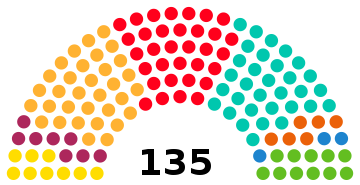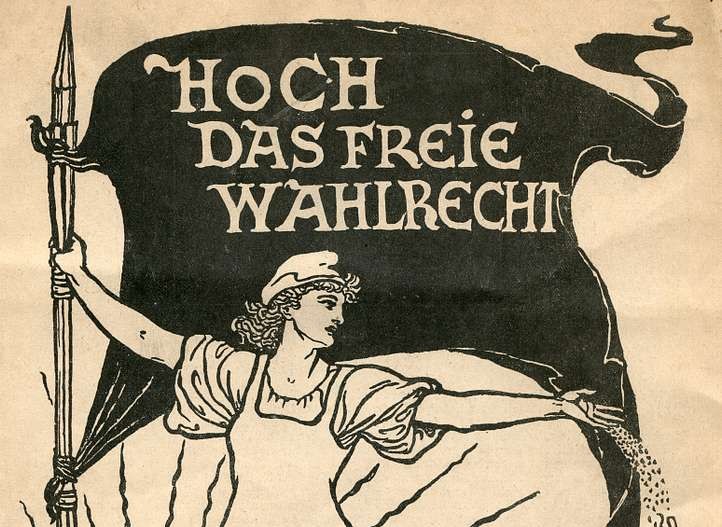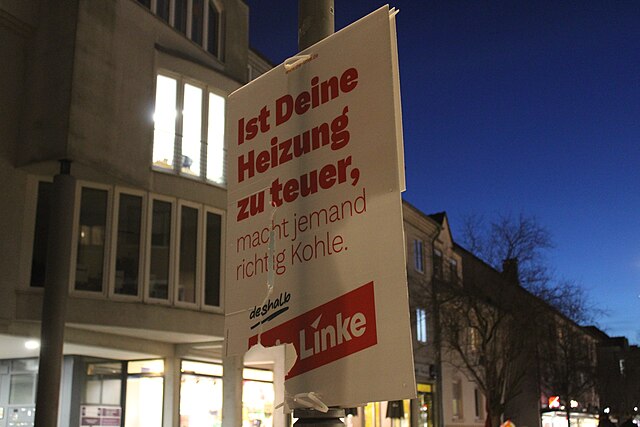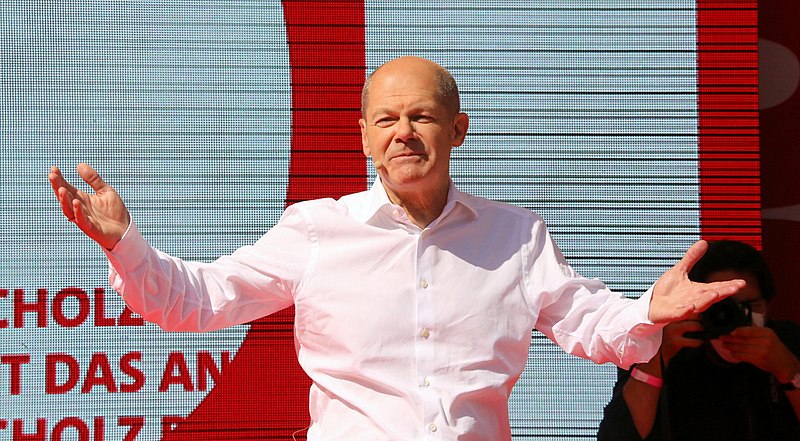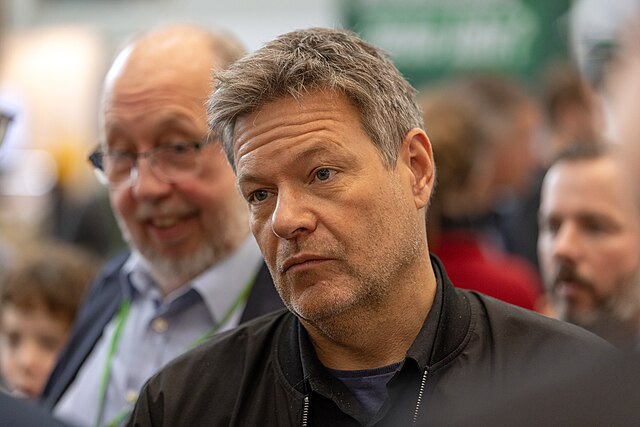Interview with Fer Cornella (FC), David Karvala (DK)
NOTE: at the bottom of this article there is a Glossary of the different parties mentioned in the interview
Thanks to both of you for agreeing to talk to us. Can you start by saying who you voted for and why?
FC: I voted for the CUP-G. It is the only party capable of ending the process of national and social emancipation that Catalonia began 10 years ago. Without a strong and decisive CUP, neither Catalonia nor the rest of Spain can advance at a social, economic and ecological level.
DK: I don’t have a vote, because I have a British passport although I’ve been living here for nearly 30 years. If I had a vote I would have voted for CUP as the anti-capitalist option committed to social struggles, although there are some issues that I don’t agree with. Other possible options would have been and the ERC even Comuns although they would be less interesting.
What do you think that the election results signify?
FC: It reaffirms and strengthens the independence process. It is, therefore, a result that weakens the Regime of 1978 that emerged after 40 years of fascist dictatorship. The independence movement is stronger than ever and has obtained more than 51% of the vote. Moreover, the parliament continues to be increasingly left.
Catalonia is currently in the middle of the third wave of the pandemic, with a risk index higher than 300. Unfortunately, the partisan interests of the PSOE prevailed over general health interests: the polls were so favourable that they did not want to postpone the elections. The far right VOX had already announced that they would make the PSC’s Salvador Illa president in order to expel the pro-independence parties from power.
DK: The mainstream right wing vote for both Ciudadanos (winners of the previous elections). and the PP collapsed. PP has been one of the 2 leading parties of the Spanish state for the last 40 years is now on the point of disappearing with just 3 MPs in a parliament of 135.
For the first time. the pro-independence parties got an overall majority of votes, not just of seats. There is also the strong and dangerous entry of the far right VOX with 11 MPs. The PSC won a majority, winning a lot of seats back from Ciudadanos but will be unlikely to be able to form a government.
The election saw rival left candidatures, most notably from the CUP and Comuns. Was it not possible to have a single left slate? And if not, why not?
DK: A single left slate wasn’t possible. The clearest problem to a joint slate is the national question. The Comuns try to avoid it. Formally they do support the right to self determination and amnesty but they’re mainly against independence.
Another problem we have to say is that the CUP is anti-capitalist, pro-independence and has lots of good people in it but also has problems with sectarianism. Possible initiatives that could be taken to try and overcome the problems and win people from Comuns to more firmly support the right to self-determination are not taken. Unity is possible in social struggles but in terms of a single electoral slate I don’t think its on the cards right now.
FC: I wish we had had an even bigger left front. However, it is true that it is not easy. Unfortunately, Unidas Podemos, at the state level has decided to support Sánchez’s PSOE government. Podemos was born in 2014 to put an end to both regime’s parties – the so called PPSOE (PP and PSOE)- but has ended up giving oxygen to the regime of 78.
In Catalonia, they wanted to repeat this same recipe, forming a coalition between En Comú Podem, PSC, and adding the ERC. For the CUP there is a no-go to pact with the PSOE, a party that is part of the so-called bloc of the §155. PSOE, PP, Ciudadanos and VOX all support the Crown and were responsible or in favour of suspending the self-government of Catalonia after the referendum in 2017. After this referendum, the main PSC candidate, Salvador Illa, had no problem participating in a unionist demonstration, taking a picture with the right and the fascists of VOX. The unity of Spain is above all. As a left party, we cannot support this.
At the local level, the Comuns have one face, but at the regional level another. Ada Colau is not a bad mayor of Barcelona and she is doing things well. However, at the regional and state level unfortunately it is something else. The Comuns still carry a large part of the old ICV. Until 2006, ICV member Joan Saura was Interior Minister in a coalition government. Repression against the social movements, squatters and anarchists was stronger than ever. For the social movements, neighbourhood organisations and the left, that coalition left no good memories. We as CUP could never tolerate such repression because we are closely linked to these movements, we come from these movements and we are these movements.
What is the current news about Catalonian political prisoners in the Spanish State?
DK: The nine imprisoned political leaders were allowed out for week-ends just before the election campaign started. This helped to calm things down politically, which benefited the PSC in the Catalan elections. Its a scandal that they’re in prison. The court that tried them is an inheritance from Franco. The Spanish government should declare an amnesty.
They’re trying to get them to ask for a pardon which would involve them saying “Yes, we were wrong, we shouldn’t have done it and we’re very sorry, basically for defending democracy, but the prisoners are refusing to do that.”
FC: Once the election results in Catalonia were known, the Attorney General called for an end to the semi-liberty which had been temporarily granted to the political prisoners. They have already spent more time in prison under the PSOE-Podemos government than under right-wing governments. Even Pablo Iglesias admitted recently that there is not a situation of full political and democratic normality in Spain.
How do you deal with the right wing of the Independence movement in Catalonia and elsewhere? Can you be sure that left wing demands would be implemented after independence?
FC: More than 40 laws approved by the Parliament of Catalonia in recent legislatures have been systematically nullified by the Spanish judicial system. These include the “energy poverty” law, to prevent energy companies from cutting off electricity to the poorest households, the “Nuclear Energy” law, which established a plan to close nuclear power plants in Catalonia, the law prohibiting fracking, the law against evictions, and the law of equality between men and women, etc.
On an international level, the pacifist movement is deeply rooted in Catalonia. For example, the demonstrations against the Iraq war in Barcelona in 2003 were among the largest ones in Europe and gathered more than a million people in the streets. We must not forget the referendum on NATO in 1984, in which in Catalonia the “No” vote won. Last but not least, there was a successful pacifist movement during the 1990s against the mandatory military service. There would be great possibilities for Catalonia to play a role of stability and peace in Europe.
DK: You have to distinguish between the tiny far right section, the Catalan National Front that made a lot of noise, managed to collect the signatures to be able to stand in the elections, and they got less then 5,000 votes out of 5 million potential voters, so if anyone tries to say that the bulk of the independence movement is far right, is just wrong.
With the experience of 2017 it should be clear that its very unlikely that we can get independence just by a formal agreement and constitutional reorganisation from above that just gives us the right to self-determination and a vote in which independence wins. This involves much more social struggle, and not just symbolic protests at the airport and a few containers being burnt.
It requires the active involvement of the working class and the working class is half and half between pro-independence and not at all convinced by independence. To win over the bulk of that working class we need to be much firmer on social change, and not just a few laws that get passed in the Catalan parliament and then get overruled by the constitutional court in Madrid. I mean really linking social demands and putting them into practise through social struggle. In other words a class orientation in terms of fighting for independence.
Both the CUP and Comuns have talked about the possibility of entering a coalition government in Catalonia. What are the advantages and dangers of such coalitions?
DK: The CUP have talked about going into coalition but I think they correctly decided not to. Some of their messages have been unclear, saying well if they agree to this, this and this condition, we might enter, but as I understand it, that’s part of an internal discussion and they’re conditions that won’t be fulfilled anyway. I think it would be a big mistake for the CUP to go into government. They’re already too involved in institutional politics at a cost of their presence on the street.
I mean they do have activists on the street. In the last few days in the protests against Pablo Hasel being imprisoned there’ve been lots of CUP members there, but in terms of the orientation of the party as a whole, its shifted strongly to their participation in the institutions. They have 300 councillors across Catalunya, which from a small party of maybe 2,000 people means that maybe half of their members are directly working in institutional politics, and entering a coalition government would make that even worse.
FC: The CUP-G has said it would be willing to enter a progressive government that advances the independence process and that stands for a referendum and an amnesty. The CUP see this as the only possibility for social, ecological and economic progress.
A coalition with the PSC would be currently a big mistake. At the European level, social democracy is finally reaping the fruits of neo-liberal policies and social cuts that they have been practising for decades. And in both France and Germany, for example, they have suffered well-deserved falls. It is not the task of the left to rescue the PSOE/PSC now. Again, it is time to overcome the Regime of the 78. There is enough force for this and all left forces should work in this direction.
Last week, Nazis organised a pogrom against refugees on the Canary Islands. This week, 300 Nazis marched in Madrid. And now the Francoist VOX party is in the Catalan parliament for the first time ever, and had a better result in the election than expected. How great is the far right threat? And what is being done to stop it?
FC: The absolute lack of overcoming the Franco dictatorship is the main problem facing Spain with the far right. Recently, a letter has been discovered addressed to the king and signed by 73 former commanders of the Spanish army, calling the current Spanish government a “social communist government endorsed by pro-terrorist and pro-independence activists”. Spain has a structural problem with fascism and far right.
At the same time, the rapper Pablo Hasel was sent to prison this week for a song in which he criticized the monarchy. According to a recent Spanish newspaper, since the 1990s around 150 artists, journalists, politicians and singers have been convicted in Spain for crimes of opinion. Obviously all kinds of coalitions and platforms against the far right and against racism are strongly needed in order to face this fascism supported and allowed by the State.
DK: In Catalunya we’ve got a solid movement that obviously needs strengthening but to give an idea, in the weeks running up to election we had protests against VOX, actions in dozens of cities with our materials of Stop VOX, stickers all over the place. Some of those were directly organised by the local groups of Unite against Fascism and Racism other were organized by Antifa groups or radical left groups, but within the framework of Stop VOX.
There’s a desperate need both to strengthen United against Fascism in Catalunya, because there’s the shock of VOX having entered, but also and even more urgently in places like Madrid or Murcia, which is just between Valencia and Andalucia, where VOX is the most voted party, so its a serious issue. The small Antifa groups do their stuff, but they can’t do what’s necessary to stop something like VOX, so we need something like Unite against Fascism and Racism in more places.
How strong is the Spanish Left? Outside election time, what projects are they involved in? Can you relate any success stories?
FC: The elections in Catalonia have strengthened the left: CUP and ERC have increased the number of deputies. The Comuns, on the other hand, have stagnated. In general, it seems now that Unidas Podemos is not benefiting from its participation in the government. On the other hand, the PSOE seems to be recovering. And that’s not any good news as this party won’t carry out the social and economic emergency policies needed to curb the crisis.
The peculiarity of the CUP is that we define itself as a “municipalist” (local-based) and internationalist party. Our presence in the other institutions, beyond the municipality, is relatively new and, for the time being, temporary. At the local level, in those few places where we govern the experience has been good and we have returned to public management services that had been outsourced such as water, street cleaning, kindergartens or street lighting. Publicly managed recovery of essential and strategic services such as energy is a key pillar of our policy. We have also done a lot of anti-repression work and anti-fascist struggle in the streets.
DK: The PSC still has members on the ground in some places but much reduced. Podemos was launched with massive enthusiasm in 2014, promising to assault the heavens and change everything, but now they’re a leftish reformist party, with institutional politics. They’ve lost most of their base. At best they’re passive supporters, at worst totally disillusioned.
Most of the Spanish left is strongly oriented on elections. Many of them have members involved in different things. I’m sure the Communist Party still have lots of members involved in trade union struggles. But as parties, they’re orientation is very much on the institutions.
We are currently celebrating 10 years of the so-called “Arab Spring” This inspired the occupation of the squares in Spain, the growth of the 15M movement and the foundation of Podemos. What can we learn from the last 10 years?
DK: It was exciting and impressive in 2011. One of the flaws of the 15 May Indignados movement was to miss vital elements particularly of the Egyptian experience. You had Tahrir, but you also had people that went home from Tahrir to their workplaces and massive workers’ struggles – the massive independent workers’ movement that grew up between 2008 and the revolution. Most of the social movement activists and the inheritors of the anti-capitalist movement after Seattle have no real conception of the working class and class struggle.
Even the radical left that does talk about the working class actually doesn’t really have a serious understanding of the working class. It’s more the idea of the working class as heroic self-conscious “I am a worker”, and most working class people aren’t like that. They have their life, their job, their house if they have it and are trying to live their life. The idea of the working class as a real, existing force is very weak, and therefore the idea of working in the main trade unions is not at all strong. For symbolic things like the Squares that’s not a problem, but if you really want to change the world, you need to connect up with the working class and that’s not happened. It didn’t happen with the 15th May movement and its not happened since then.
FC: Institutions alone will not be the engine of change. The presence and strength of social movements in the streets is essential and must remain strong. These 10 years of process in Catalonia have reinforced precisely this: the culture of demonstration and protest in the street has gained a lot of strength and, thus, people have become politicized. There has been a change of culture, an emancipatory process. People have lost their fear of practicing peaceful civil disobedience and fighting for what they believe in. The strong protests and mobilizations that have been generated spontaneously this week in defence of Pablo Hasel, are also another product of this landscape. On the other hand, the repression does not stop but we must overcome it and persist in the mobilizations and the presence of the people in the street. This is all what we have, it is our strength and is the key.
Fer Cornella is of Catalan origin but has been living abroad for about 20 years. He is a member of the Die Linke party in Germany and supports the exteriors section of the CUP.
David Karvala has lived in Catalonia since 1993. He is a member of marx21 in the Spanish state and is one of the spokespeople of Unity Against Fascism and Racism
Glossary of parties
- Ciudadanos (Cs) – populist Spanish party which is currently moving to the right
- CUP / CUP-G (Candidatura d’Unitat Popular-Un nou Cilce per Guanyar) – left-wing Catalonian pro independence party/alliance
- En Comú Podem (ECP) – left-wing Catalonian coalition containing Unidas Podemos and Barcelona En Comú, the party of Ada Colau, Mayor of Barcelona
- Esquerra Republicana (ERC) – social democratic Catalonian pro-independence party
- ICV – Left-Green Catalonian party, dissolved in 2019
- Izquierda Unida (IU) – left wing coalition including the Spanish Communist Party
- Junts per Catalunya (JxCat) – centre-right Catalonian party
- Podemos – left wing Spanish party, founded in 2014
- PP – conservative, Christian Democratic Spanish party
- PSC – Catalonian sister party of the social democratic PSOE
- PSOE – social democratic Spanish party
- Unidas Podemos – left-wing Spanish electoral alliance between IU and Podemos
- VOX – Far right Spanish party with links to organised Nazis
